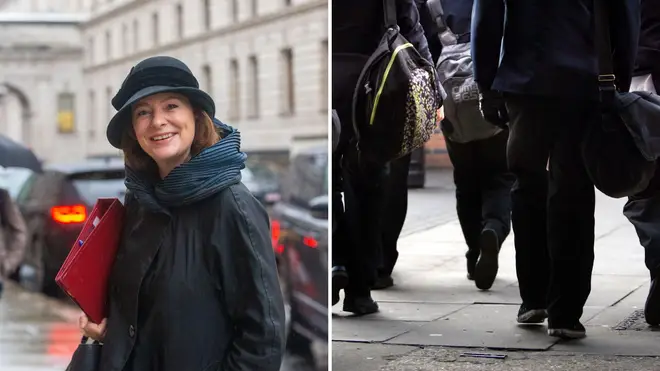
James O'Brien 10am - 1pm
19 December 2023, 10:37 | Updated: 19 December 2023, 12:33

Schools must not force teachers to call trans pupils by their new pronouns and should use their names as much as possible, new rules say.
Long-awaited guidance for schools aims to set out how teachers should deal with pupils who want to "socially transition" and change their gender in the classroom.
Schools should take a cautious approach to children who want to change their gender at school, it says, and that parents must be included in decisions, unless it would put kids at risk.
Teachers can allow pupils to change their name if they think its in the best interests of the child to do so – but should consult with parents and the others in the school first.
Staff can decline requests for a pupil to change their pronouns – and they should only be done on “rare occasions”.
Teachers should still be allowed to call groups “girls” or “boys” without fear of punishment.
And no child should be punished for accidentally mis-gendering a classmate.
There is no duty to allow a child to socially transition at school, it adds.
Ministers say they wanted to help schools with extra clarity in "response to the complex phenomenon of the increasing number of children questioning their gender".
The education secretary said it puts children's interests first - but a union for school leaders said it would but heads in a difficult position.

The guidance today will go out for a 12 week consultation to gather the views of parents, teachers and pupils.
It won't change the law, so won't be legally binding.
But already Liz Truss, the former PM has said it doesn't go far enough.
She wants to change the law to ban social transitioning in schools for kids under 18 and to ban puberty-blocking hormones for kids too.
he said: “I fear that activists and others will be able to exploit loopholes in the guidance and the existing legal framework to pursue their agenda, leaving children at risk of making irreversible changes and with single-sex spaces not sufficiently protected.”
Single sex spaces must also be safeguarded and "never... compromised by allowing a child of the opposite sex to participate", it says.
Sleeping arrangements, like dormitories or tents, should be sex separated and if a child questioning their gender asks for an alternative arrangement this should be considered but not at the expense of the safety and comfort of other pupils.
Schools can consider an alternative toilet or changing room for children questioning their gender, but the must not allow them into a space designated just for the opposite sex.
Uniforms should be worn by sex and while changes can be made, swimwear should not be altered.
Competitive sport should be fair which will "almost always" require boys and girls to be separated, especially as they get older.
Education secretary Gillian Keegan said: "This guidance puts the best interests of all children first, removing any confusion about the protections that must be in place for biological sex and single-sex spaces, and making clear that safety and safeguarding for all children must always be schools' primary concern.
"Parents' views must also be at the heart of all decisions made about their children – and nowhere is that more important than with decisions that can have significant effects on a child’s life for years to come."
But critics say that the long-awaited guidance could spark more confusion for teachers.
Paul Whiteman, general secretary of school leaders' union NAHT, warned: "The ongoing delays to this guidance due to political wrangling have been a source of significant frustration, and it is far from ideal for it to be published right at the end of term, after some schools have already broken up for Christmas.
"NAHT will be reviewing these draft proposals to ensure they provide useful information and support for school leaders and will submit a response to the Government's consultation on behalf of our members.
"Upon an initial look, it would appear this guidance leaves a lot of questions unanswered, meaning school leaders will continue to be placed in an incredibly difficult position."